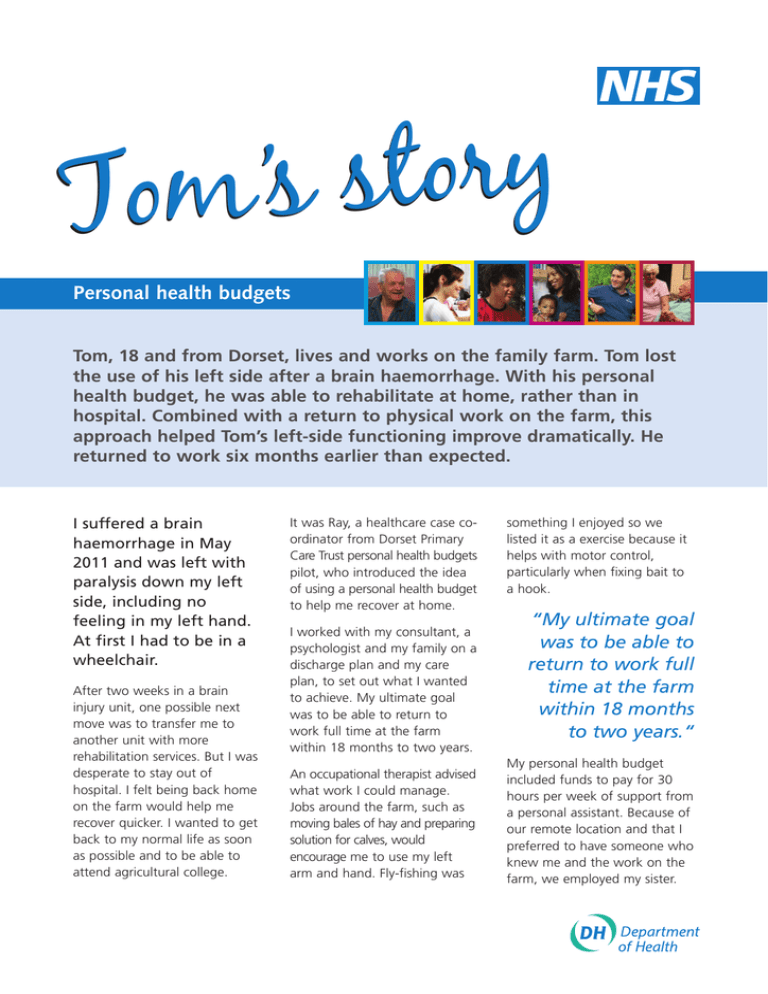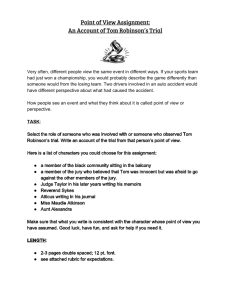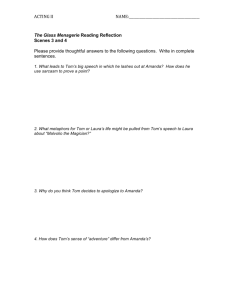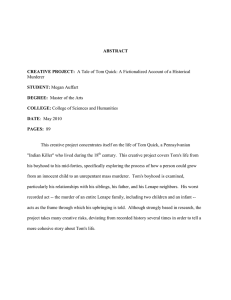Tom’s story Personal health budgets
advertisement

y r o t s s ’ m o T Personal health budgets Tom, 18 and from Dorset, lives and works on the family farm. Tom lost the use of his left side after a brain haemorrhage. With his personal health budget, he was able to rehabilitate at home, rather than in hospital. Combined with a return to physical work on the farm, this approach helped Tom’s left-side functioning improve dramatically. He returned to work six months earlier than expected. I suffered a brain haemorrhage in May 2011 and was left with paralysis down my left side, including no feeling in my left hand. At first I had to be in a wheelchair. After two weeks in a brain injury unit, one possible next move was to transfer me to another unit with more rehabilitation services. But I was desperate to stay out of hospital. I felt being back home on the farm would help me recover quicker. I wanted to get back to my normal life as soon as possible and to be able to attend agricultural college. It was Ray, a healthcare case coordinator from Dorset Primary Care Trust personal health budgets pilot, who introduced the idea of using a personal health budget to help me recover at home. I worked with my consultant, a psychologist and my family on a discharge plan and my care plan, to set out what I wanted to achieve. My ultimate goal was to be able to return to work full time at the farm within 18 months to two years. An occupational therapist advised what work I could manage. Jobs around the farm, such as moving bales of hay and preparing solution for calves, would encourage me to use my left arm and hand. Fly-fishing was something I enjoyed so we listed it as a exercise because it helps with motor control, particularly when fixing bait to a hook. “My ultimate goal was to be able to return to work full time at the farm within 18 months to two years.“ My personal health budget included funds to pay for 30 hours per week of support from a personal assistant. Because of our remote location and that I preferred to have someone who knew me and the work on the farm, we employed my sister. She helped me around the farm, when I drove the tractor and fed the pigs. Keeping active was key to improving movement on my left side. I also used my personal health budget to attend hospital physiotherapy sessions, see a personal trainer twice a week at a local gym, and go swimming. All to build up my stamina and muscle usage. I took my personal health budget as a direct payment which helped us pay professionals. Because I was 17 when I had my accident my mum controlled paying everyone, from a separate bank account. Ray helped, from working on my care plan through to liaising with the occupational therapist. Treatment was reviewed every month. All the services combined to markedly improve my left side. I am now able to walk more steadily, I can run and play five-a-side football! The occupational therapist used to visit twice weekly. But as I got better, this was reduced to weekly. Now it’s once a month. In April I returned to work fulltime on the farm. This was at least eight months ahead of my original forecasted return. In reality, I was back to work parttime within three months! I am also now able to attend college. The personal health budget enabled me to organise my care and achieve what I wanted at home. Without it, I could have got back so much use from my left side in the time that I have. Dr John Burn, a consultant in rehabilitation and brain injury, says that a personal health budget resulted in a better-than-expected outcome for Tom. The personal health budget enabled Tom to personalise his treatment, giving him and his family much more choice. Plus, Tom and his family could recruit specialist professionals such as the occupational therapist who was able to devise a treatment programme for Tom at the farm and supervise his rehabilitation there. With the use of a personal health budget, Tom’s progress has been faster than might have been expected. For this reason, his health outcomes have been better. Roger Webb, project manager for the NHS Dorset pilot, says personal health budgets are encouraging providers to think differently about how services are provided. A personal health budget enabled us to source the person-centred care Tom wanted and would help him. Our community rehabilitation team would normally have struggled to provide for Tom at his remote farm location. But, in particular, a personal health budget enabled an independent occupational therapist and a personal assistant who knew Tom and the farm environment to be employed. Personal health budgets are encouraging us to change the way we think about providing services. This really has brought great health outcomes for Tom. A personal health budget allows people to have more choice, flexibility and control over the health services and care they receive. The Department of Health thanks the people and families concerned for sharing their personal stories. For further information please contact: Kym Lang, communications manager Personal health budgets pilot programme tel: 020 7210 5091 email: personalhealthbudgets@dh.gsi.gov.uk web: www.dh.gov.uk/personalhealthbudgets




